As discussed in this 2018 piece, relativistic starflight can put the entire universe within one’s reach (assuming that one has access to mind-boggling amounts of energy and commands utterly implausible technology). But as that essay points out, relativistic starflight is also a form of time travel, which often works out badly for all involved.1
For example…
Childhood’s End by Arthur C. Clarke (1953)
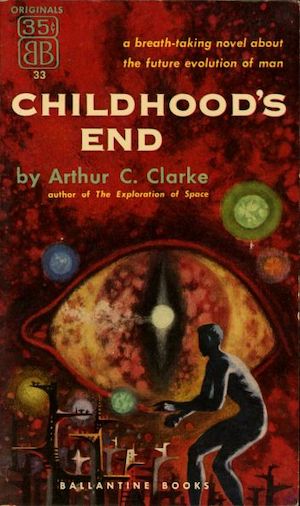
The Overlords who took control of the Earth command impressive technologies, none of which permit them to sidestep speed-of-light limits. Accordingly, when Jan Rodricks stows away on an Overlord vessel bound for NGS 549672, his round trip lasts only a few months. In the meantime, eighty years pass on Earth.
Jan can’t stop what’s happening on Earth; he has as much power as an individual snowflake caught in an avalanche already in motion. All he can do is give the Overlords a human perspective on events.
***
The Long Way Home (AKA No World of Their Own) by Poul Anderson (1955)
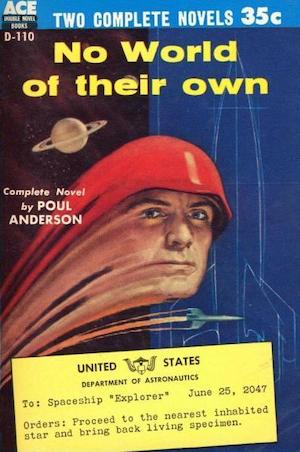
Having successfully developed a faster-than-light drive, the United States of America dispatched a bold quartet of explorers across the galaxy. Several thousand light-years later, the Explorer returns to Earth, where its unfortunate crew discovers that while each jump may have been instantaneous to them, it was only speed-of-light to the universe.2 Thousands of years have passed since they left.
A boatload of relics is nothing new to a civilization that arose in the context of easy lightspeed travel. But while the ancient Americans are merely a curiosity, the alien ambassador they brought home with them is another matter.
***
Houston, Houston, Do You Read? by James Tiptree, Jr. (1976)
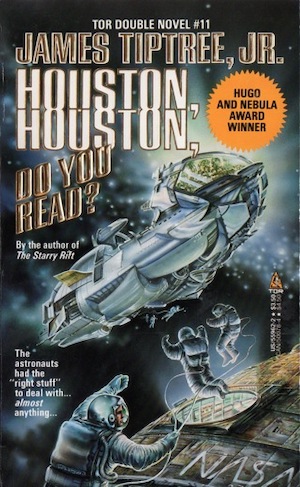
The Sunbird loses contact with Earth while circumnavigating the Sun. Initially, the three men on board assume that a solar flare knocked out their communications. Only after making contact with another space vessel do they learn the truth: whatever happened to them cast their ship across time and space.3
The human society of the future arose, as so many societies of the future do, from the ashes of the past. Catastrophe swept away the old order, including all men. Human society is now exclusively female. The crew of the Sunbird are the first men seen since the rise of the current civilization. How can these curious relics be integrated into modern society?
***
Beloved Son by George Turner (1978)
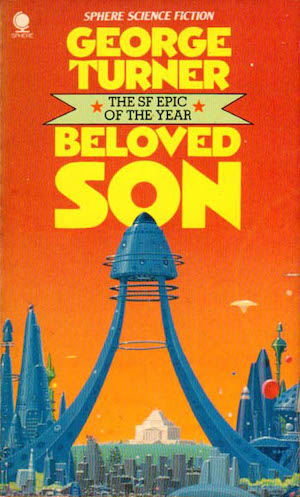
Commander Albert Raft and his crew return from a forty-year interstellar voyage to discover that the old world order has annihilated itself. After great sacrifices, a new world order, the Ethical Culture, has re-established a stability (of sorts). The 21st-century Earth to which the voyagers return is lethal to most of the crew, but the planet-bound seem to lead stable and peaceful lives…
“Seem to lead” being the operative words: Raft and the carefully suppressed secrets that provoked his forty-year trip are just the sort of disruptive element that will establish whether the Ethical Culture truly works. Or doesn’t.
***
Flies From the Amber by Wil McCarthy (1995)
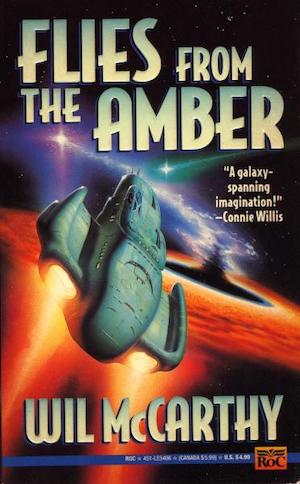
Long before humans mastered relativistic starflight, an alien race managed the same feat with technology that made ours look like toys. Although difficult to recognize as artifacts, the aliens left evidence of their conflicts all across the Malhelan system, forty light-years from Earth. The transformed materials are a curiosity, enough to attract a scientific mission from Earth.
Among the Malhelan system’s curious features: a stellar-mass black hole. The same technologies that permitted the aliens to travel from star to star also facilitated surviving the conditions near a black hole. Mere moments for the combative aliens have been thousands of years for the external universe, which means the humans are about to get ringside seats for a space war fought with incomprehensible energies and no regard for the concept of innocent bystanders.
***
No doubt each of you owns a stack of books touching on this theme that you are astounded that I failed to mention. The comments are, as ever, below.
In the words of Wikipedia editor TexasAndroid, prolific book reviewer and perennial Darwin Award nominee James Davis Nicoll is of “questionable notability.” His work has appeared in Publishers Weekly and Romantic Times as well as on his own websites, James Nicoll Reviews and Young People Read Old SFF (where he is assisted by editor Karen Lofstrom and web person Adrienne L. Travis). He is a four-time finalist for the Best Fan Writer Hugo Award and is surprisingly flammable.
[1]Readers curious to learn more about this exciting aspect of our universe might start here: https://en.wikipedia.org/wiki/Special_relativity, or here: http://www.physicsguy.com/ftl/html/FTL_intro.html. Or, heck, build yourself a tachyon rocket and explore the delightful possibilities of relativistic starflight yourself (https://reactormag.com/2018/08/17/when-will-sf-learn-to-love-the-tachyon/)! Note: management takes no responsibility for the consequences of near-lightspeed travel.
[2]“How on Earth did nobody notice the drive was only as fast as light rather than faster than light?” you ask. Well, they seem to have forgotten to put any clocks on the test vehicles—clocks that would have revealed the blatantly obvious time dilation. But points for deciding that the first extrasolar trip wouldn’t be to Proxima and back.
[3]Stars move.










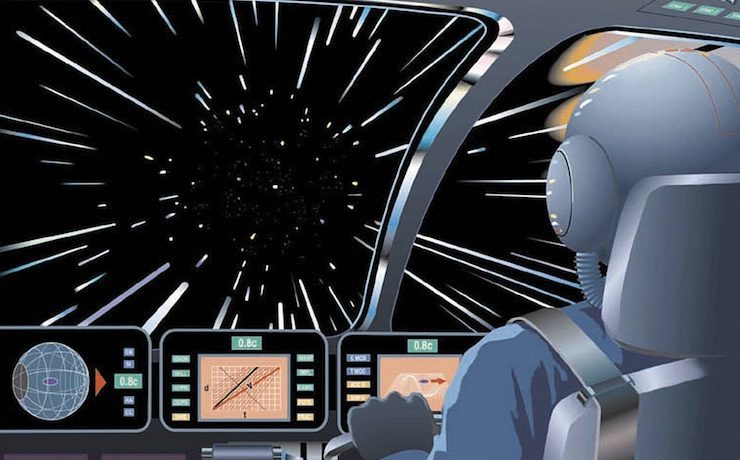
Joe Haldeman’s The Forever War is a gimme, here, I think.
Is there any method of space travel that can theoretically counter time dilation? In other words, is there any way to travel great distances and stay relatively close in time to people back home on Earth?
Austin @2: Yes, the only way that we currently know (more or less) how to travel between stars works just fine. Go very slowly. If you take 10,000 years for a return trip to Alpha Centauri, then very close to 10,000 years will pass on Earth, and you’ll stay in sync.
There’s Alastair Reynolds’ Revelation Space series.
Moffit’s Genesis books, sort of. Humans reappear in the Milky Way millions of years after going extinct, thanks to their genetic information being emailed across millions of light-years, and then their gracious hosts deciding humans were so wonderful building them a near-light starship to get rid of them made sense.
@2: Greg Egan had a method, of sorts. Whenever people leave the planet, everyone who stays behind on the planet goes into suspended animation until the travelers return (adjusting for the proper time of the travelers). Not recommended unless you have easy suspended animation and no scheduled visits from non-natives, who might expect you to be awake when they arrive.
Didn’t Karl Schoeder’s Lockstep use a similar solution?
The Poul Anderson book I would have put on the list is Tau Zero. They have a hell of a timey-wimey problem and the symmetry or cyclical element appeals to me somehow.
Possibly too well known for Tor.com?
@2 Karl Schroeder’s Lockstep has a neat gimmick. Kuiper belt objects have barely enough resources to support life … so humans hibernate for long multi-year periods (centuries in some cases) while robots collect resources (and maintain the hibernation systems). Then the people wake up for a shorter time (months to maybe a few years), then go back to sleep for another cycle. Meanwhile, slower-than-light ships travel between worlds with their crews also in hibernation; if they arrive at a world while it’s in hibernation, they stay in hibernation until it wakes up.
The title comes from the fact that far-flung worlds use the same schedule. The worlds that use longer cycles find themselves lagging those that use short cycles, which feels like travelling forward in time.
Not a relativistic thing at all … but connected to the idea of keeping far flung groups on similar time frames.
I already used it in another essay, and I wanted examples where people tried to go home.
@7: Similar, but Egan is using light speed travel (or very close to it) so the relativistic effects are important, which isn’t the case for the Schroeder (Egan was first, by the way – he uses this idea in Schild’s Ladder from 2002).
@3 – Haha, I guess I should have been more specific! Is there any theoretical way to travel great distances quickly (i.e. traveling light speed) and avoid time dilation? Or is that a hard and fast rule of physics: travel that fast and time dilation inescapably occurs. I believe even people traveling through a wormhole would still experience time dilation, no?
@9 – Thanks! That sounds like a rather clever method. Though it doesn’t really address the issue of people traveling fast through space and somehow staying in sync with other worlds (Star Wars really is science fiction?).
For us old fogies, there’s always Niven’s World out of Time.
A short story: “Winter’s King,” by Ursula Le Guin, involves NAFAL (early-as-fast-as-light) interstellar travel, and the effects of that time dilation/displacement.
A lot of her other fiction also has the NAFAL starships, but in less central ways.
@12/Austin:
Nope. Passing through a theoretical wormhole is no different than passing through a section of flat spacetime; there’s no acceleration, and no tilting of the light cones of stay-at-home vs. travelers. A stable wormhole’s not exactly a practical solution for humans, though, since its construction requires physical conditions (viz., negative energy density) that, so far as physicists know, can’t be created at a macroscopic scale.
You can, however, use time dilation to turn a wormhole into a “timehole”: move one mouth at relativistic speed and it ages more slowly, becoming the “pastward” mouth of the link. This trick was used in the late Robert L. Forward’s Timemaster.
15: Thank you for giving me an excuse to drop this link into the thread!
Humanly traversable wormholes by Juan Maldacena and Alexey Milekhin https://arxiv.org/pdf/2008.06618.pdf
provides a wormhole model where the traveller experiences very little time, while the stay at homes experience rather more time.
Childhood’s End also poses a timey-wimey complication that is, I think, less based on physics…
Cbfvgvat n enpvny zrzbel nzbat uhznaf gung rkcynvaf jul gur Bireybeqf ybbx n ybg yvxr bhe pbaprcgvba bs qrzbaf- bayl vg jbexf onpxjneqf.
Ted Sturgeon’s “Time Warp” has a “forward in space, backward in time” drive. I couldn’t remember the title and if you search just for that phrase the top results are all mathematical.
For us old fogies there’s also Heinlein’s Time for the Stars, where the ships moving at relativistic (but sublight) speed stay in communication with Earth by using telepathically-linked pairs of twins (one of whom stays and ages at the usual rate, and one of whom ages more slowly due to relativistic slippages, and comes home and (in a very Heinleinian twist) marries his great grand-niece or some such).
In re The Long Road Home: I think I’ve seen other works where people didn’t bother to test the actual travel time in advance. Which seems really really weird.
When it comes to relativistic relics, in both the literal and figurative meanings: surely “Semley’s Necklace” / “The Dowry of the Angyar” by Ursula Le Guin?
And for those who want it in song- https://www.youtube.com/watch?v=kE8kGMfXaFU
A classic early Ursula Le Guin story, “Semley’s Necklace”, features relativistic time dilation. Originally published in 1964 as “The Dowry of Angyar”. It was incorporated into Rocannon’s World. It’s deeply moving and the science makes it work.
Another classic is “The Inspector’s Teeth” by L. Sprague de Camp, originally published in 1950. It’s a relativistic time dilation comedy story. It’s been a long time since I last read it, but I’m pretty sure it’s as funny as ever. I should read it again.
@17 – Umm did a cat walk across your keyboard? :D
@23- Ah, I can never tell when something is common enough not to need the notation. That’s a ROT 13 substitution to hide spoilers. If you don’t fancy doing the decoding yourself you can drop it into https://rot13.com/ to translate it back.
@24 – Ah, thanks! Nope, I’ve never heard of that. Curiously, do people know it well enough to decode it with minimal effort? When options such as whiting/blacking out available, it seems kind of a burdensome method to use. Kind of cool, though, in a secret decoder ring way.
@25- Personally, I like it because it does require a little more effort. I’m a fidgeter so often if I’m reading comments I’ll idly highlight blocks of text or click on things. For ROT-13 I have to make a conscious decision that yes, I want to read this spoiler.
@25/Austin
To be fair, you’re in a James Nicoll thread so you should expect some Usenet-isms ;)
ROT-13 became popular in a time where people mostly read in plain text so there wasn’t whiteout or spoiler tags easily available.
The most famous book I can recall involving a journey in space leading to problems because of relativistic time dilation is Monkey Planet by Pierre Boulle. Unless, of course, my memory is playing tricks on me, and I’m taking this element from the original movie based on it and assuming it was in the novel as well.
Austin@12: In relativity theory, moving and contracting space while dilating time are two different ways of saying the same thing. Asking whether it’s possible for you to move at close to lightspeed relative to me without having your proper time dilate relative to mine is like asking whether it’s possible to freeze water without turning it into a solid.
The Alcubierre “Warp Drive” is usually proposed as a method for travelling faster than light. But you can run it slower than light too, and the warp effect prevents any time dilation.
There’s also the song The ’39 by Queen
For so many years have passed
Though I’m older but a year
Your mother’s eyes from your eyes
Cry to me
@19 I was also thinking of “Time for the Stars,” arguably the most “tragic” of Heinlein’s juveniles. There’s the heartrending moment when the torchship is “rescued” by one of the new FTL ships, whose crew boasts of how many new planets they’ve discovered in a short time, and one of the torchship telepaths, thinking of how many of the crew had died during their own years of explorations asks, “You mean everything we’ve done…wasn’t necessary?” To say nothing of their returning to a “future” Earth where they’re looked upon as quaint relics and subject to ridicule, unable to fit into ordinary society.
Lbh pbzr gb erpbtavfr vg, (fvp) – but I believe that while you probably can learn to read ROT13, it is a mistake to do that – since its purpose is to put the message into your hands but let you choose not to read it. And what I can read, I find difficult not to read, if you see what I mean.
On the other hand, the design of ROT13 is that putting text into code, and undoing it, are the same process.
But Tor doesn’t like us to wander from the article subject (time dilation)… um… “Cvpgherf Qba’g Yvr” ? :-)
“Earthsearch”, BBC radio serial and novels, deals with Challenger, a cold-sleep mission to hoped new home planets which terminates (as we start) when the ship’s computers disagree with the crew about goals and turn off the meteor defence to kill them all except for four infants who are then raised by robots: however, the meteors also damage the computers, which no longer know about relativity. Nevertheless, they set course for Earth. It isn’t there.*
Vg nyfb vfa’g Rnegu: vg vf ng yrnfg fgebatyl fhttrfgrq gung Fby vf abg gurve ubzr fgne (juvpu unf n fvzvyne ohg zber unovgnoyr frg bs cynargf) ohg vf gur bar gung gur uhznaf riraghnyyl qrpvqr gb frggyr ba.
* To stay on topic, I think Challenger gets home 500,000 years after they left, which itself is a surprise to the computers and the new crew.
@32 Although they do say that it was the existence of instantaneous communication (via telepathy) that pointed them in the direction that eventually led to the FTL drives.
But yes, it’s definitely more melancholy than a lot of his other juvies.
@31: had you heard the author of that song got his PhD in astrophysics after Queen’s star faded? There have been a number of rock stars who were SF fans (or vice versa), but ISTM that Brian may have been the most qualified.
His Ph.D involved interstellar dust, he left it for a long long time ;-)
I read that he has his own asteroid. But I guess Freddie had a planet named after him, kind of small but seriously hot :-)
The alternate (and original) title of Anderson’s No World of Their Own is The Long Way Home, not the The Long Road Home. Astounding, April through July 1955. First book version as The Long Way Home was Ace’s 1978 edition, I believe.
Some of Ken MacLeod’s books qualify. There is the Engines of Light trilogy where the clue is in the name. The wormhole in the Fall Revolution series (The Stone Canal and The Cassini Division, if I remember correctly) is between our solar system and a very distant one and has a correspondingly large time difference between the two ends.
Wow! These are exactly the type of sf books I love to read! Thanks for this.
@35 Brian May apparently was on the New Horizon team – the Pluto probe.
Tau Zero
Does Charles Stross’ Neptunes Brood count? It’s not concerned with returning home, as much as it is concerned with financial returns — what sorts of assets pay off, and what sort of culture is required, to value interstellar investment that are only realized at the speed of light?
Robert Carnegie @@@@@ 36
His Ph.D involved interstellar dust, he left it for a long long time ;-)
Interplanetary dust, actually (responsible for the “zodiacal light“). He started working on it in the early 1970s, left it off in 1974, and took it back up again in 2006. (There had, amazingly, been almost no work on this particular sub-field in the intervening time, so his unpublished data and analysis was still new and valuable.)
You can read his thesis (“A Survey of Radial Velocities in the Zodiacal Dust Cloud”) here [PDF file]. (There are a couple of passing references to Queen in it…)
Also, there’s Alastair Reynolds’ Pushing Ice, where a group of near-future asteroid miners go investigate a strange rogue moon coursing through the Solar System and are caught in their FTL collateral properties that carries them trhough time, faster than they could expect
Thiugh it turned out well, in the end, therre is Spider Robinson’s “adaptation” of some notes that Heinlein left (and Ginny gave Spider permission to use, IIRC) – “Variable Star”.
And, @8, durn your hide (big grin) you beat me to it! Somehwhere I still have a copy of that (or, maybe not; I lost an entire library to a border’s male, unneutered cat)
I suggest Frederik Pohl’s 1977 novel Gateway – first in the Heechee series
Perhaps more of a timey wimey example, I would like to add Vernor Vinge’s “A Deepness in the Sky” where the alien natives (“the spiders”) of a planet hibernate for a couple of centuries when their star goes dormant for 215 out of every 250 years. Their entire culture is built around their “awake” cycles.
@46 Gateway… hmm, I think of the time warping force that I have in mind as an event that happens around the end of the story – but it’s told all out of order. As in, the hero gets into big money. My impression is that the event is hinted at and avoided by the narrator until describing it is unavoidable, but I haven’t read it recently, and when I first did, I wasn’t aware that a certain sex act is referred to as “tbvat qbja”, so it was even less clear to me why the expression reminded him of the event.
(DO NOT THINK ABOUT THE EVENT) :-)
Or: Do not talk about (if it is) what happens at the end.
There is further time warping in the sequels, of course! At least some of them… Is “Gateway 2” when the readers, but not the hero, find out where the mysteriously absent alien Heechee went to…
@2 For theoretically making interstellar travel (and staying in sync) possible, I often have to think back to a short story by J.G. Ballard. It’s called “The Waiting Grounds”
The trick is to go slow instead of fast. By slowing their biology and experienced time down, humanity speeds up the rest of the universe, including the speed of light. Slow down by a factor of 1 million, and Alpha Centauri is only something like a light-minute distant. Only a few months for the speeds of space probes we build today. And since the actual speed is not even close to relativistic, no bothersome time differentials between ships and planets.
CJ Cherryh’s Merchanter novels often touch on the problems caused by the time dilation effects of starships travelling between stars. Great stories too.
The Secret of the Martian Moons by Donald A. Wolheim also had an interesting solution to the problem of time dilation.
Gur Znegvnaf nyy cnpxrq gurve ontf naq gur ragver cynarg jrag ba n fvtug frrvat gbhe bs gur Tnynkl gbtrgure.
@31
For my life
Still ahead
Pity me
@49 — Sounds a lot like Cordwainer Smith’s “The Lady Who Sailed The Soul” (1960).
The pilot’s consciousness was slowed down but not the aging process.
I can’t believe no one has mentioned Marina J. Lostetter’s brilliantly original and readable Noumenon trilogy. The third part came out in paperback recently, and I’ll be reading it soon, but judging by the first two novels it will be wonderful. Come on all you oldies (I’m 67 myself), get reading the new young authors! Start with this! You will be pleased.
I originally rejected Bob Shaw’s Light of Other Days for this thread. Slow glass does funny things with time. But not relativistic things.
Then I thought; slow glass certainly does funny things to the speed of light.
Funny things with time. Funny things with speed of light. That’s kind of basic to the whole relativity thing.
I’m not sure about the timey-wimey part.